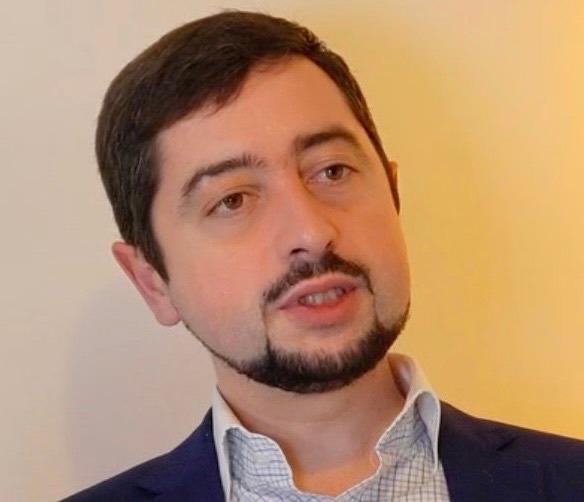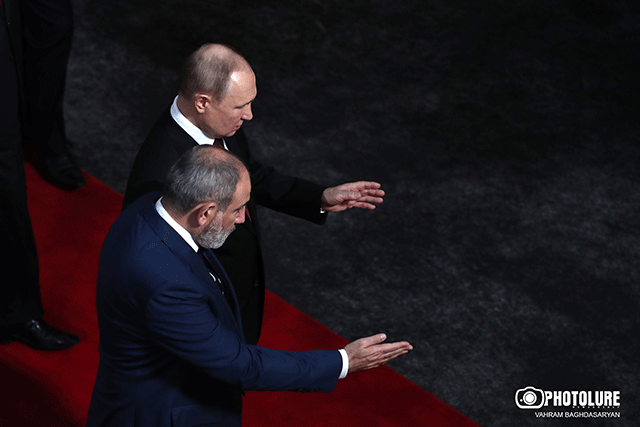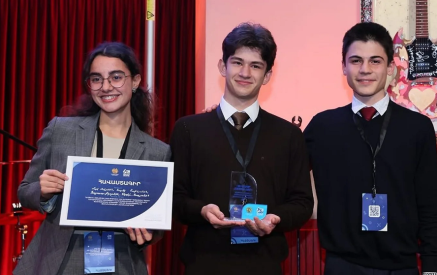In Relations with Armenia, Russia Has Exposed Its Unreliability
Valeriu Pasha, Chairman of WatchDog.MD think-tank
– In light of Moldova’s current interests, what is the significance of the Russian-Ukrainian war and Armenian-Azerbaijani post-war confrontation? What threats and prospects lie for Moldova in this context?
Read also
It is probably not even worth comparing these two conflicts in terms of Moldova’s internal agenda and priorities. Russian aggression against Ukraine affects our country immensely. This is an existential question – calling a spade a spade, if Ukraine does not withstand, Russia will simply take over Moldova. The Armenian-Azerbaijani conflict is not and has never been a priority for Moldova. In addition to the common threat of a Russian war against Ukraine, already pointed out by me, the economic problems are another threat. There is very high inflation in Moldova, the country has very serious problems with export and import routes. We, in fact, have lost the main source of our imports – the Ukrainian Black Sea ports. Our imports from China alone accounted for 8-9% of our GDP. The vast majority of it was shipped through the Ukrainian ports. Now everything has to be reoriented as inflation reached a level of 30% last year. Added to that, Moldova is grappling with energy crises in both gas and electricity supplies caused by Gazprom’s overcharging in the European market and the destruction of Ukraine’s electrical infrastructure. All this has hit Moldova quite hard. And this is just a short list of problems.

Valeriu Pasha
In terms of prospects, I would highlight the shift in the perception of the region by the EU countries, due to which Moldova and Ukraine applied for EU membership. In terms of the progress of democracy and adherence to the rule of law, Moldova was better prepared than Georgia, although Georgian state institutions technically are much stronger, but they are being pulled down by the authorities. The granting of EU candidate status to Moldova represents a huge progress that would have been unimaginable a few years ago. Additionally, the very process of conflict and post-conflict settlement, in our view, offers a chance for a final resolution to the Transnistrian dispute. This region in its current format will not be able to survive the post-war structure, Russia will no longer be able to support separatism there, and moreover, Russia’s influence has decreased to the point that it will not even be able to hinder a peaceful solution to the problem. This is an opportunity for the future.
For the country, the prospect lies in the awakening of the political class to finally address security issues. What has happened so far can hardly be called anything but sabotage: hiding behind the neutral status of the country, politicians refused to invest in security, the army, and societal preparation. There was a devil-may-care attitude, counterproductive for a neutral country, which should ensure its security and defense itself.
– What is Moldova’s agenda in relations with the countries of the South Caucasus in terms of both its foreign and domestic policy priorities? What’s the role of the Transnistrian conflict in shaping this agenda?
Taking into account its interests and problems, Moldova has never taken sides in the Karabakh conflict. The country has a formal stance, and it is objective, since any affiliation may affect the Transnistrian issue. Hence, for Moldova, the key priority is to recognize borders of the states formed after the collapse of the USSR, within the union republics’ boundaries, and there can be no other interpretation in our case. On the other hand, Moldova, both at the state and civil society levels, has consistently supported peace efforts, advocating for dialogue between the parties. Furthermore, there have been informal talks about Chisinau becoming an alternative to Minsk as a negotiating platform, which I consider a good idea, given the cultural ties and dialogue.
Moldova maintains constructive relations with both Armenia and Azerbaijan, regardless of who is in power. Moreover, dialogue with Armenia and Azerbaijan exists both at the level of government and opposition forces. The economic factor is significant in relations with Baku: there are Azerbaijani investments, there is a certain commercial exchange, there is cooperation in the field of gas, which is at its initial stage. On the other hand, the trade turnover with Armenia is small, given, among other things, the possibilities of physical export. When it comes to security issues, one cannot say that the entire Moldovan society is following the conflict. The expert community, diplomats are following the developments, as they affect the region, and are studying Russia’s position. In my view, Russia’s behavior in the Karabakh issue, and in general, in relations between Armenia and Azerbaijan, has exposed its incapacity and unreliability. This state is not capable of projecting force to maintain peace, provide security guarantees, and, in parallel, to respect the sovereignty of peoples. Objectively, the attitude of the Putin regime towards the authoritarian power in Armenia was different, while Putin did not forgive the democratic choice of the Armenian people. And to this end, he was not afraid, in particular, of letting the war break out. Furthermore, all the peace guarantees provided by Russia through its peacekeepers are not being met, Russia is not capable of counteracting this.
Over the past 20 years, Moldova has been traditionally maintaining the closest relationship with Georgia among the countries of the South Caucasus not because we have some kind of well-established economic ties, but due to our presence in various international formats: for a certain period it was GUAM, and over the past 14 years – the Eastern Partnership, where the Moldova-Ukraine-Georgia triangle has been formed. It is often considered by the EU in a package approach. Against this background, there is an intensified political dialogue, which has fueled for many years the format of cooperation within the framework of European political families. Despite the change of power in Georgia, there are, all the same, positive dynamics in our relationship. There are very close ties at the level of civil society – quite strong contacts, joint projects, visits and so on. Currently, at the level of political leadership there are significant challenges. The Moldovan leadership has been clear in rejecting the anti-democratic shifts of the leadership of Georgia. Accordingly, there is no particular dialogue at this level. Furthermore, in Chisinau they are following the Georgian authorities’ curtseys towards the Russian Federation, which naturally cannot be endorsed. Nevertheless, the countries have lots of similarities. Naturally, the level of economic integration of Moldova with the EU is much higher, given the common border. But we understand that this package approach will persist in the future, and Moldova and Georgia will share a similar path in many aspects.
– What countries and organizations contribute to the security system of Moldova? Is there a consensus in Moldova on its current foreign policy vector?
There is no full consensus, it is not yet possible to talk about priorities that would be supported by 80% of the population. Perhaps the idea of joining the EU enjoys the highest level of support. The population of the right bank of the Dniester is considered to be about 54% in favor, about 30% against. However, the situation is different in Transnistria. In addition, there is a huge Moldovan diaspora, which is very different from the Armenian one. This is a young diaspora, everyone holds Moldovan citizenship, these are people who have left in the last 20-25 years. They actively participate in elections. If we also take into account their preferences, we will have around 70-75% of EU support. On other issues, especially those related to security, there is no such consensus, as there have been no serious debates on the matter. This is difficult to understand for people in the South Caucasus, where defense and security issues were widely discussed even in the 1990s, but this has not been the case for Moldova. One way or another, Moldova is building relations with the United States, with the level of relations having reached a historical maximum over the past year. Added to that, individual relationships with certain countries should be highlighted. Despite the war, communication and cooperation with Ukraine have been strengthened. Same is true for the dialogue with EU member states. Traditionally, this is the incrementally developing dialogue with Romania, which supports Moldova in almost everything. There is a dialogue with the countries of the Black Sea basin. Our diplomacy is actively seeking to build relationships with everyone.
– Amidst the development of new algorithms for international relations, Russia and the EU, being parties to the Russian-Ukrainian conflict, position themselves as equidistant mediators in the Armenian-Azerbaijani processes. How is it perceived in Moldova?
I think this question is pertinent to a very narrow circle of people, particularly diplomats with a strong interest in the region. There are differing views on the matter – Russia’s aggression against Ukraine could potentially turn into aggression against Europe. The plans are quite clearly announced, they should have been recognized since the 2008 invasion of Georgia. The year 2014 should have definitely put everything in its place, but it wasn’t until February 24, 2022 that people began to understand the severity of the situation. I don’t think that the EU or NATO are a party to the conflict, I believe that supporting Ukraine is a rational policy to prevent future risks for themselves, a form of active containment policy. The Western countries have never abandoned the position of a mediator, this is exclusively Russia’s unwillingness. Therefore, I believe, it is not quite correct to draw a comparison in this regard.
– The blockade of the Nagorno-Karabakh residents by Azerbaijan has been ongoing for. What is people’s stance in Moldova regarding these methods of pressure on Armenia and NKR? In your view, which parties have greater interest in establishing a long-term stability regime in the South Caucasus?
The topic receives little attention in Moldova, there is little coverage of the South Caucasus region in the press. The recent events in Georgia were widely covered, but, again, through contacts in civil society and at the political level. The war in Ukraine dominates the news agenda: I have not even seen serious discussions of this issue. Even the 2020 war was not widely reported. The very process of negotiations, settlement, agreements is little discussed and is poorly known. It is hard for me to determine who has a long-term interest, since the interests of potential parties are quite conflicting, even NATO does not have a consolidated position. On the one hand, there is the position of the United States, the Western European countries that advocate for peace in the region, and on the other hand, we have Turkey’s perspective, which differs greatly. Turkey quite understandably sides with one of the parties to the conflict. And it is difficult for me to assess the sincerity of Russia’s stance and how much of it is aimed at retaining influence in the region and attempting to annex both countries as this influence intensifies. I think Putin has a deliberate policy towards all post-Soviet states and does not make a significant distinction between Armenia and Ukraine.
Series of interviews “Agendas and New Algorithms of Policies in the South Caucasus – 2023” is being organized within the framework of the Region Research Center’s project “New Agendas for Peace and Stability in the South Caucasus after the Karabakh 2020 War”. The project is being implemented with the support of the Black See Trust for Regional Cooperation. The opinions expressed in this material are those of the authors and do not necessarily represent the opinions and positions of the Black See Trust for Regional Cooperation or its partners.























































